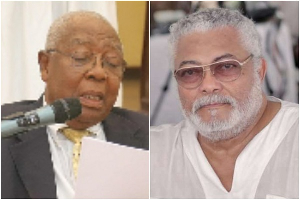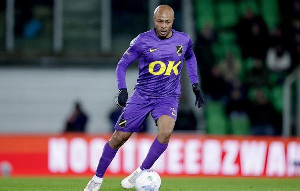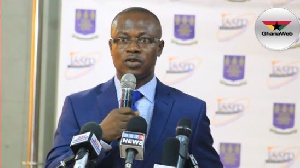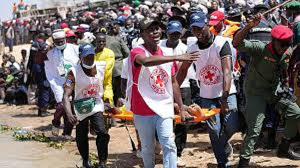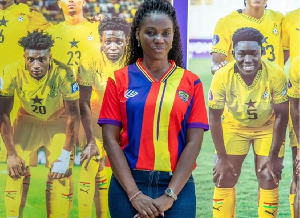Dr Paul Amuna
30th December 2014
This is the last of a three part series of reflections on this topic. In the first two parts (ghanaweb Opinions 27th December 2014), I wrote on happenings elsewhere and tried to draw lessons that we might apply in our own circumstances. It was interesting to read the comments. I have chosen to highlight just one of them here from Mensa Abrampa who said:
“You're right. We Ghanaians take a lot of things for granted, especially freedom of speech. The use of very offensive, intemperate, obscene and profane language, the lack of civility in public discourse especially on social media, and the total disregard for truth and integrity are all issues that need to be taken seriously and elevated to the national platform for discussion. The national platform because the rot and decay in mannerism and integrity equally affects those who occupy the lower rungs on the social scale as well as top ranked political leaders, even the President. The disappearance of civility in our public discourses has its origins from the early years of the Rawlings era. What example is the leader of the nation setting for the younger generation when he mounts the platform to rave and rant invectives rain and make allegations against opponents which are uninvestigated and unsubstantiated? Recently the President's response to Mr Greenstreet's remarks lacked decorum and in my opinion was unpresidential and uncalled for. It's time for a national conversation because what we say in public and on social media tells the world much about us.”
I have chosen today to specifically look at some scenario examples of our understanding, use and abuse of our powers, privileges and freedoms (including speech) in the Ghanaian context. I am grateful for Abrampa’s comment and believe it resonates with many. Let me begin by reminding us of a funny yet serious happening earlier in 2014, one which has led to a new parlance in Ghana “Who said Tweaa? Are you my co-equal?” Even this joke was not lost on the president who in a light-hearted moment in parliament used it during his 2014 State of the Nation address when he said to heckling Members of Parliament:
“Herr! Order. I’m not your co-equal” to a chorus of hilarious laughter, after which he added: “Who said ‘tweaa’?” to yet more laughter. If nothing at all, at least this particular joke by the president tells us he also has a sense of humour and can allow his HUMAN side to express itself even in the most challenging of ‘Chambers’ and situations.
The original source of the statement was itself anything but funny. The hapless District Chief Executive (DCE) of Ahafo ano South, Mr. Gabriel Braimah apparently was not amused when a heckler in a crowd he was addressing in his district as Guest Speaker said “Tweaa” within earshot of the DCE in apparent disagreement with something the DCE must have said in his speech. The DCE’s immediate reaction showed anger, disgust and resulted in expletives including – “Are you my co-equal” for which he was later to regret, be reprimanded and render an apology because it brought his position as a public servant into disrepute.
I recall a case in the mid-1980s during the PNDC era when during a speech JJ Rawlings gave in Tamale, a young student observed: “he is telling us to tighten our belts. We all remember him when he came after June 4th (1979). He was very slim, nyanga nyanga. Now look, look how much he has put on weight and is looking good, and telling the rest of us to tighten our belts. This is unfair.” Those who are old enough to remember will recall a period of severe famine mixed with economic embargo Ghana suffered sometime in the 1980s, leading to the “Rawlings chain” characterization of the appearance of the collar bone, a sign of weight loss resulting from ‘chronic hunger’.
The long and short of it is that this poor student who was merely stating the ‘obvious’ at the time and ‘exercising his freedom of speech and expression’ was bundled by some of “chairman Rawlings’” minders, ‘buga buga soldiers, and taken to the Gondar Barracks in Tamale where he was “disciplined”. I believe Ghana has come a long way from those days when the abuse of power was rampant and people suffered needlessly simply for daring to err their views in public.
The vitriolic we read on ghanaweb and other Ghanaian Social Media demonstrate how far our dialogue has deteriorated and ironically at a time when we seem to be enjoying our ‘full’ democratic rights to say whatever we like, wherever, anytime and to whomsoever. The fact that this ‘freedom’ allows people to say or do thing uninhibited in my view is of itself part of our problem. That is not to suggest even remotely, that we should curtail our freedoms, but merely to emphasize our lack of individual responsibility to accompany those very freedoms that we so often take for granted. The recent case of Mr Ivor Greenstreet, General Secretary of the CPP and the reactions and fall-out from his “Good will Speech” to the delegates of a ‘rival political party’ the National Democratic Congress (NDC) in Kumasi is a classic example.
Personally, I believe the idea of rival parties inviting their opponents to attend their party congresses as observers, and giving them a platform to show ‘solidarity’ or deliver brief good will messages is a good and sound development in our political modus operandi. It shows how much our democracy is maturing and has the potential to send a powerful message across to the Ghanaian electorate that even though politicians and political parties may disagree on ‘matters of substance, policy, even governance’, they are not ENEMIES and are ALL interested in contributing to making a DIFFERENCE in the life of citizens and our national DEVELOPMENT. I believe these sentiments are conspicuously expressed in various party manifestos and let’s face it, there is often very little to choose between the various political parties and during party debates, you tend to find the protagonists almost saying the same things, but yet disagreeing with what the other said. Funny indeed!!
What were the issues in Mr Greenstreet’s speech that have generated so much column inches and public debate?
One thing I have learnt over the years and from others is that if you are given five minutes to ‘pitch’ on a subject, you must make it count. Make an impact, leave a take-home message. Let your audience have something to ponder. Give them food for thought. I want to believe Mr Greenstreet had this philosophy at the back of his mind when it was his turn to address the NDC crowd. After all, they are all “Nkrumahist parties” so from the crowd’s perspective, they might have expected him to give a really nice ‘sisterly or brotherly’ message of goodwill!! Yes, Mr Greenstreet made an immediate impact alright, and his speech not only ‘resonated’ throughout the congress, it almost overshadowed other issues and happenings. More important, the reactions to it which were equally instantaneous (wisely or unwisely) have dominated the political and social dialogue since, and provide some food for thought and lessons on how (or how not) to make a public “goodwill speech” and how (or how not) to respond to views freely expressed by others, however repugnant and ‘disappointing’ to you. Here is why:
1. The key message in the Greenstreet speech was: “Ghanaians are not SEEING your better Ghana; this bronya is a “dry” bronya” and “you don’t care”.
2. The immediate reaction to his speech were boos, ‘cat-call’s and being quickly (and perhaps a little roughly) whisked away in his wheelchair. Expressions of regret by party apparatchiks for inviting “someone like that to our congress”.
3. Senior NDC party officials reacted badly, including Honourable Albin Bagbin’s reference to Greenstreet being “possessed by demons”
4. The president, who is often very measured in his tone, on this occasion let his frustration get the better of him and even though he choose his words carefully, he couldn’t resist the use of the expression “selective myopia” (selective blindness) to characterise what he regarded as unfair and ‘inaccurate’ comment or put another way, a clear ‘political jibe’ from a rival party
5. Many neutrals felt that although Greenstreet had every right to criticise the government in its performance and / or fulfilment of its ‘manifesto promises’ or ‘contract’ with the Ghanaian electorate, this was simply NOT the platform for him to make such an “attack”
6. Other commentators and NDC party officials took it even further – notable among them, one Samuel George Nettey, a so-called “Communications Consultant” working with the presidency. Sam George chose to use Facebook as his medium for maximum effect and although this means used by politicians, footballers, socialites and whoever has often proved counterproductive and ‘landed’ people in all sorts of trouble, I have never understood why people choose to use it to ‘spread their message’. In Sam George’s view, the reason Greenstreet could not SEE the “Better Ghana” is because “he needs an “ELEVATION” to SEE!!!
7. Sam George has particularly been widely condemned (and rightly so) for his INSENSITIVE and in my own view unnecessary comments and his unwise attempt to be too ‘smart’ in attacking Greenstreet’s attempt to ‘steal the show’ at the NDC congress
8. Greenstreet was firmly backed by his party chairwoman, Ms Samia Nkrumah who has since repeatedly stood that ground and resolutely defended Greenstreet without reservation
9. Among others, the National Women’s Organizer of the opposition National patriotic Party (NPP) chose to criticise the president’s own speech and his use of the expression “SELECTIVE MYOPIA”. The NPP Women’s Organizer described it as “REPREHENSIBLE” and unbefitting a presidential speech.
10. Other politicians including Dr Ndoum and Nana Konadu have spent time in the media reinforcing the message of 2014 national hardship and advising the government to “listen to the people and criticism”, an apparent support for the original ‘Greenstreet rant’.
What do I make of all this and what are the lessons for us?
I’ll like to tackle items 1, 4, and 6 and 10 first as follows:
First of all Ivor Greenstreet was expressing a sentiment (‘on behalf of the people’) and doing so forcefully and without inhibitions but the question is whether that was the right forum for such an ‘outburst’. He made his point and in the president’s response, he used the expression “SELECTIVE MYOPIA” and as a reminder, he went on to list and dilate on things his government have done and their achievements in the face of challenges which he also acknowledged. People’s criticism of the president focused on his use of the word “myopia” which some might have felt was insensitive, including the NPP Women’s Organizer who described it as “reprehensible”. In my view, the president’s use of that expression was technically correct although if I were advising him, I would have said to him not to make such a reference. To show that he was listening and that he CARES, he could have said, e.g.: ‘OK, I hear you loud and clear, but let me show you what you say you are not seeing’ (Make a joke of it, defuse the situation). Greenstreet made reference to SIGHT – “Ghanaians are not SEEING” your better Ghana …”. That might have prompted the president to use the expression “selective myopia” in other words, ‘people choose to see what they want to see and not others. The NPP Women’s Organizer’s use of the word “reprehensible” in reference to the president’s use of the expression is completely misplaced, wrong and tantamount to cheap political point-scoring which though ‘politically expedient’ for a party in opposition, will not necessary endure here to the neutral public like myself.
Sam George said Greenstreet needed “ELEVATION” to SEE the Better Ghana. He was totally wrong to use that expression and in my view did it deliberately as a swipe at Greenstreet who uses a wheelchair because of his disability. Not only was this most insensitive, it was calculated, meant to do harm, totally uncalled for and quite frankly serious enough in my view to call into question his continuous position as a government appointee. He made it worse by trying to be ‘too clever’, arguing that he meant it as a “philosophical” expression. You cannot dig yourself into a deeper hole when you are clearly wrong. He probably did not think of the ramifications and should have avoided it in the first place. As a public (and government or party) “communicator” when it was criticised and condemned, he should have apologised immediately and unreservedly instead of trying in his vein attempt to defend it. Although I note that he has since shaken hands with Greenstreet when they appeared together on TV, that to me does not still make up for what was a serious breach of the peace and an insult to wheel-chair users not only in Ghana but worldwide. It is not at all surprising that he was so roundly condemned by rights groups and well meaning Ghanaians. I would have hoped and expected that the Minister for Gender, Children and Families, Honourable Oye Lithur would make some bold statements of condemnation; and for the NDC government to distance itself from Sam George’s comments. I believe that there are certain matters of discipline which we need in our national life and public service and here was one such situation where in my view the government should have acted decisively instead of leaving it to George and Greenstreet to “shake hands” when the former’s actions affected many more people who had nothing to do with politics.
Taking points 1, 2, 3, 5 and 8 together:
The boos of disapproval Mr Greenstreet received initially from the NDC crowd was because they felt his comments were inappropriate and not in the ‘spirit of goodwill, not in the right place, especially in the presence of the sitting (and a former) president and vice president in attendance. But he might have felt, where better than this platform to err his views on behalf of ‘the silent majority’ of Ghanaians. I personally would not have used his approach and though I would have brought the issues affecting Ghanaians to the attention of the president, I would not have been confrontational and almost insulting. Furthermore I would have highlighted some of the government’s achievements, and then said what I felt were missing ingredients that needed fixing. But he said what he had to say, and the crowd clearly did not like it. I can see why Samia would continue to want to defend Greenstreet but I have a feeling the content of his speech and its delivery should have been better ‘choreographed’ by the CPP and frankly but for the ‘rude interruption’ of Sam George, many might have found Samia’s unreserved support for Mr Greenstreet rather unwise. Her continuous support and repetition of Greenstreet’s rant to me is now unnecessary and unhelpful in the wider scheme of things – after all the point has been made and forcefully too, by the man himself, although his approach was not the best.
As to the aftermath and other politicians’ views 3, 7, 9
Mr Bagbin was completely out of order to characterize Greenstreet as being “possessed of demons”. This is wholly wrong and smacks of what I often describe as the “arrogance of power”. Who gives Bagbin the right to condemn another person like that? Yes, the platform may not have been the right place for Greenstreet to make such a speech and the CPP may have been unwise to support him as such, but “demon possession”? This is totally unacceptable and should not be coming from our politicians and public servants. Mr Bagbin also needs to apologise for his poor use of words and false characterization of Mr Greenstreet.
Mr Greenstreet’s speech reminds me of one such ‘cock-up’ by my former School Prefect in 1978 when he was asked to deliver the vote of thanks during a visit of members of the Council for higher Education to our school at that time. Instead of simply saying ‘thank you for coming’, he chose to have his “five minutes of fame” and spent over 30 minutes in a ‘ranting lecture’ which left literally everyone in the Macdonald Assembly Hall with our heads bowed in SHAME!!! Not only was the speech uncalled for, it was long, gibberish, winding, boring, on the wrong platform and directed at the wrong people!!! It was unbelievable and you simply wondered if no one had bothered to brief him on what a “vote of thanks” was supposed to be. We were all left embarrassed, in shock, disbelief and regret, that the usual approach for finding a simple, intelligent and eloquent student to ‘do the honours’ was completely missed on this occasion and our School prefect had been such a ‘bad ambassador’.
My take home message:
Making a political or any other speech for that matter can be easy (although usually daunting) and making an instant impact may be expedient. Yet the choice of our words, the audience, the nature of the message and COMUNICATION are essential to achieving our desired goals. As we have seen from the Greenstreet ‘saga’ and other stories I have shared and tried to reflect upon, a simple speech or expression can have such wide and unintended consequences. We can hurt ourselves and along with us, so many other people simply by communicating the wrong messages at the wrong place, the wrong time, to the wrong audience and via the wrong media. We all have a lot to learn about our public and private discourse and I hope that these reflections are equally shared by others and that we will do better in the coming year (s).
Happy New Year to One and All
Opinions of Friday, 2 January 2015
Columnist: Amuna, Paul


